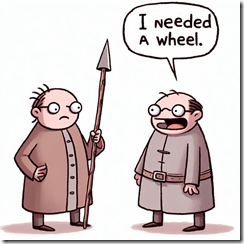YouTube: Personal Views, Policies, Historical Information, and Information Shaping about Statues
January 4, 2024
 This essay is the work of a dumb dinobaby. No smart software required.
This essay is the work of a dumb dinobaby. No smart software required.
I have never been one to tour ancient sites. Machu Pichu? Meh. The weird Roman temple in Nimes? When’s lunch? The bourbon trail? You must be kidding me! I have a vivid memory of visiting the US Department of Justice building for a meeting, walking through the Hall of Justice, and seeing Lady Justice covered up. I heard that the drapery cost US$8,000. I did not laugh, nor did I make any comments about cover ups at that DoJ meeting or subsequent meetings. What a hoot! Other officials have covered up statues and possibly other disturbing things.
I recall the Deputy Administrator who escorted me and my colleague to a meeting remarking, “Yeah, Mr. Ashcroft has some deeply held beliefs.” Yep, personal beliefs, propriety, not offending those entering a US government facility, and a desire to preserve certain cherished values. I got it. And I still get it. Hey, who wants to lose a government project because some sculpture artist type did not put clothes on a stone statue?
Are large technology firms in a position to control, shape, propagandize, and weaponize information? If the answer is, “Sure”, then users are little more than puppets, right? Thanks, MSFT Copilot Bing thing. Good enough.
However, there are some people who do visit historical locations. Many of these individuals scrutinize the stone work, the carvings, and the difficulty of moving a 100 ton block from Point A (a quarry 50 miles away) to Point B (a lintel in the middle of nowhere). I am also ignorant of art because I skipped Art History in college. I am clueless about ancient history. (I took another useless subject like a math class.) And many of these individuals have deep-rooted beliefs about the “right way” to present information in the form of stone carvings.
Now let’s consider a YouTuber who shoots videos in temples in southeast Asia. The individual works hard to find examples of deep meanings in the carvings beyond what the established sacred texts present. His hobby horse, as I understand the YouTuber, is that ancient aliens, fantastical machines, and amazing constructions are what many carvings are “about.” Obviously if one embraces what might be received wisdom about ancient texts from Indian and adjacent / close countries, the presentation of statues with disturbing images and even more troubling commentary is a problem. I think this is the same type of problem that a naked statue in the US Department of Justice posed.
The YouTuber allegedly is Praveen Mohan, and his most recent video is “YouTube Will Delete Praveen Mohan Channel on January 31.” Mr. Mohan’s angle is to shoot a video of an ancient carving in a temple and suggest that the stone work conveys meanings orthogonal to the generally accepted story about giant temple carvings. From my point of view, I have zero clue if Mr. Mohan is on the money with his analyses or if he is like someone who thinks that Peruvian stone masons melted granite for Cusco’s walls. The point of the video is that by taking pictures of historical sites and their carvings violates YouTube’s assorted rules, regulations, codes, mandates, and guidelines.
Mr. Mohan expresses the opinion that he will be banned, blocked, downchecked, punished, or made into a poster child for stone pornography or some similar punishment. He shows images which have been demonetized. He shows his “dashboard” with visual proof that he is in hot water with the Alphabet Google YouTube outfit. He shows proof that his videos are violating copyright. Okay. Maybe a reincarnated stone mason from ancient times has hired a lawyer, contacted Google from a quantum world, and frightened the YouTube wizards? I don’t know.
Several question arose when my team and I discussed this interesting video addressing YouTube’s actions toward Mr. Mohan. Let me share several with you:
- Is the alleged intentional action against Mr. Mohan motivated by Alphabet Google YouTube managers with roots in southeast Asia? Maybe a country like India? Maybe?
- Is YouTube going after Mr. Mohan because his making videos about religious sites, icons, and architecture is indeed a violation of copyright? I thought India was reasonably aggressive in its enforcement of its laws? Has Alphabet Google YouTube decided to help out India and other countries with ancient art by southeast Asia countries’ ancient artisans?
- Has Mr. Mohan created a legal problem for YouTube and the company is taking action to shore up its legal arguments should the naked statue matter end up in court?
- Is Mr. Mohan’s assertion about directed punishment accurate?
Obviously there are many issues in play. Should one try to obtain more clarification from Alphabet Google YouTube? That’s a great idea. Mr. Mohan may pursue it. However, will Google’s YouTube or the Alphabet senior management provide clarification about policies?
I will not hold my breath. But those statues covered up in the US Department of Justice reflected one person’s perception of what was acceptable. That’s something I won’t forget.
Stephen E Arnold, January 4, 2024
Exploit Lets Hackers Into Google Accounts, PCs Even After Changing Passwords
January 3, 2024
 This essay is the work of a dumb dinobaby. No smart software required.
This essay is the work of a dumb dinobaby. No smart software required.
Google must be so pleased. The Register reports, “Google Password Resets Not Enough to Stop these Info-Stealing Malware Strains.” In October a hacker going by PRISMA bragged they had found a zero-day exploit that allowed them to log into Google users’ accounts even after the user had logged off. They could then use the exploit generate a new session token and go after data in the victim’s email and cloud storage. It was not an empty boast, and it gets worse. Malware developers have since used the hack to create “info stealers” that infiltrate victims’ local data. (Mostly Windows users.) Yes, local data. Yikes. Reporter Connor Jones writes:
“The total number of known malware families that abuse the vulnerability stands at six, including Lumma and Rhadamanthys, while Eternity Stealer is also working on an update to release in the near future. They’re called info stealers because once they’re running on some poor sap’s computer, they go to work finding sensitive information – such as remote desktop credentials, website cookies, and cryptowallets – on the local host and leaking them to remote servers run by miscreants. Eggheads at CloudSEK say they found the root of the Google account exploit to be in the undocumented Google OAuth endpoint ‘MultiLogin.’ The exploit revolves around stealing victims’ session tokens. That is to say, malware first infects a person’s PC – typically via a malicious spam or a dodgy download, etc – and then scours the machine for, among other things, web browser session cookies that can be used to log into accounts. Those session tokens are then exfiltrated to the malware’s operators to enter and hijack those accounts. It turns out that these tokens can still be used to login even if the user realizes they’ve been compromised and change their Google password.”
So what are Google users to do when changing passwords is not enough to circumvent this hack? The company insists stolen sessions can be thwarted by signing out of all Google sessions on all devices. It is, admittedly, kind of a pain but worth the effort to protect the data on one’s local drives. Perhaps the company will soon plug this leak so we can go back to checking our Gmail throughout the day without logging in every time. Google promises to keep us updated. I love promises.
Cynthia Murrell, January 3, 2024
Google, There Goes Two Percent of 2022 Revenues. How Will the Company Survive?
January 1, 2024
 This essay is the work of a dumb dinobaby. No smart software required.
This essay is the work of a dumb dinobaby. No smart software required.
True or false: Google owes $5 billion US. I am not sure, but the headline in Metro makes the number a semi-factoid. So let’s see what could force Googzilla to transfer the equivalent of less than two percent of Google’s alleged 2022 revenues. Wow. That will be painful for the online advertising giant. Well, fire some staff; raise ad rates; and boost the cost of YouTube subscriptions. Will the GOOG survive? I think so.
An executive ponders a court order to pay the equivalent of two percent of 2022 revenues for unproven alleged improper behavior. But the court order says, “Have a nice day.” I assume the court is sincere. Thanks, MSFT Copilot Bing thing. Good enough.
“Google Settles $5,000,000,000 Claim over Searches for Intimate and Embarrassing Things” reports:
Google has agreed to settle a US lawsuit claiming it secretly tracked millions of people who thought they were browsing privately through its Incognito Mode between 2016 and 2020. The claim was seeking at least $5 billion in damages, including at least $5,000 for each user affected. Ironically, the terms of the settlement have not been disclosed, but a formal agreement will be submitted to the court by February 24.
My thought is that Google’s legal eagles will not be partying on New Year’s Eve. These fine professionals will be huddling over their laptops, scrolling for fee legal databases, and using Zoom (the Google video service is a bit of a hassle) to discuss ways to [a] delay, [b] deflect, [c] deny, and [d] dodge the obviously [a] fallacious, [b] foul, [c] false, [d] flimsy, and [e] flawed claims that Google did anything improper.
Hey, incognito means what Google says it means, just like the “unlimited” data claims from wireless providers. Let’s not get hung up on details. Just ask the US regulatory authorities.
For you and me, we need to read Google’s terms of service, check our computing device’s security settings, and continue to live in a Cloud of Unknowing. The allegations that Google mapping vehicles did Wi-Fi sniffing? Hey, these assertions are [a] fallacious, [b] foul, [c] false, [d] flimsy, and [e] flawed . Tracking users. Op cit, gentle reader.
Never has a commercial enterprise been subjected to so many [a] unwarranted, [b] unprovable, [c] unacceptable, and [d] unnecessary assertions. Here’s my take: [a] The Google is innocent; [b] the GOOG is misunderstood, [c] Googzilla is a victim. I ticked a, b, and c.
Stephen E Arnold, January 1, 2024
Quantum Management: The Google Method
December 27, 2023
 This essay is the work of a dumb dinobaby. No smart software required.
This essay is the work of a dumb dinobaby. No smart software required.
I read a story (possibly sad or at least bittersweet) in Inc. Magazine. “Google Fired 12,000 Employees. A Year Later, the CEO Says It Was the Right Call, Just Done in the Wrong Way” asks an interesting question of a company which has triggered a number of employee-related actions. From protests to stochastic parrots, the Google struggles to tailor its management methods to the people it hires.
What happens when high school science club engineering is applied to modern tasks? Some projects fall down. Hello, San Francisco, do you have a problem with a certain big building? Thanks, MSFT Copilot. Good enough.
The story reports:
A few days ago, Google’s CEO Sundar Pichai openly acknowledged that the way Google managed the layoff of 12,000 employees, about 6 percent of its workforce, was not done right…. Initially, Google’s stance on the layoffs was presented as a strategic necessity, a move to streamline operations and focus on crucial business areas…. Pichai’s frank admission that the process could have been handled differently is a notable shift from the company’s earlier justifications??.
What I think this means is that Google’s esteemed leader made a somewhat typical decision for a person imbued with some of the philosophy of a non-Western culture. In 2023, Google has lurched from Red Alert to Red Alert. In January 2023, Microsoft seized the marketing initiative in the lucrative world of enterprise artificial intelligence. And what about some of Google’s AI demonstrations? Yeah, some were edited and tweaked to be more Googley. Then after a couple of high profile legal cases went against the company, Sundar Pichai has allegedly admitted that he has made some errors.
No kidding. Like the architect engineers of the Florida high rise which collapsed to ruin the day of a number of people, mistakes were made. I suppose San Francisco’s Millennium Tower could topple over the holidays. That event would pull some eyeballs off the online advertising company.
The sad reality is that Google’s senior management is pushing buttons and getting poor results. The Inc. Magazine article ends this way:
The key questions moving forward are: Will Google face any repercussions for the way it handled the layoffs? What concrete actions will the company take to improve communication and support for its employees, both those who were let go and those who remain? And, importantly, how will this experience shape Google’s, and potentially other companies’, approach to workforce management in the future?
Questions, just not the right one. In my opinion, Google’s Board of Directors may want to ask:
Is it time to big adieu to Sundar Pichai and his expensive hires? With the current team in place, Google’s core business model at risk from ChatGPT-type findability services, legal eagles hovering over the company, and now a public admission that firing 12,000 wizards by email was a mistake, I ask, “What’s next, Sundar?”
Net net: The company’s management method (which reminds me of how my high school science club solved problems) is showing signs of cracking and crumbling in my opinion.
Stephen E Arnold, December 27, 2023
Quantum Supremacy in Management: A Google Incident
December 25, 2023
 This essay is the work of a dumb dinobaby. No smart software required.
This essay is the work of a dumb dinobaby. No smart software required.
I spotted an interesting story about an online advertising company which has figured out how to get great PR in respected journals. But this maneuver is a 100 yard touchdown run for visibility. “Hundreds Gather at Google’s San Francisco Office to Protest $1.2 Billion Contract with Israel” reports:
More than 400 protesters gathered at Google’s San Francisco office on Thursday to demand the tech company cut ties with Israel’s government.
Some managers and techno wizards envy companies which have the knack for attracting crowds and getting free publicity. Thanks, MSFT Copilot. Close enough for horseshoes
The demonstration, according to the article, was a response to Google and its new BFF’s project for Israel. The SFGate article contains some interesting photographs. One is a pretend dead person wrapped in a shroud with the word “Genocide” in bright, cheerful Google log colors. I wanted to reproduce it, but I am not interested in having copyright trolls descend on me like a convocation of legal eagles. The “Project Nimbus” — nimbus is a type of cloud which I learned about in the fifth- or sixth-grade — “provides the country with local data centers and cloud computing services.”
The article contains words which cause OpenAI’s art generators to become uncooperative. That banned word is “genocide.” The news story adds some color to the fact of the protest on December 14, 2023:
Multiple speakers mentioned an article from The Intercept, which reported that Nimbus delivered Israel the technology for “facial detection, automated image categorization, object tracking, and even sentiment analysis.” Others referred to an NPR investigation reporting that Israel says it is using artificial intelligence to identify targets in Gaza, though the news outlet did not link the practice to Google’s technology.
Ah, ha. Cloud services plus useful technologies. (I wonder if the facial recognition system allegedly becoming available to the UK government is included in the deal?) The story added a bit of spice too:
For most of Thursday’s protest, two dozen people lay wrapped in sheets — reading “Genocide” in Google’s signature rainbow lettering — in a “die-in” performance. At the end, they stood to raise up white kites, as a speaker read Refaat Alareer’s “If I must die,” written just over a month before the Palestinian poet was killed by an Israeli airstrike.
The article included a statement from a spokesperson, possible from Google. This individual said:
“We have been very clear that the Nimbus contract is for workloads running on our commercial platform by Israeli government ministries such as finance, healthcare, transportation, and education,” she said. “Our work is not directed at highly sensitive or classified military workloads relevant to weapons or intelligence services.”
Does this sound a bit like an annoyed fifth- or sixth-grade teacher interrupted by a student who said out loud: “Clouds are hot air.” While not technically accurate, the student was sent to the principal’s office. What will happen in this situation?
Some organizations know how to capture users’ attention. Will the company be able to monetize it via a YouTube Short or a more lengthy video. Google is quite skilled at making videos which purport to show reality as Google wants it to be. The “real” reality maybe be different. Revenue is important, particularly as regulatory scrutiny remains popular in the EU and the US.
Stephen E Arnold, December 25, 2023
Google AI and Ads: Beavers Do What Beavers Do
December 20, 2023
 This essay is the work of a dumb dinobaby. No smart software required.
This essay is the work of a dumb dinobaby. No smart software required.
Consider this. Take a couple of beavers. Put them in the Cloud Room near the top of the Chrysler Building in Manhattan. Shut the door. Come back in a day. What have the beavers done? The beavers start making a dam. Beavers do what beavers do. That’s a comedian’s way of explaining that some activities are hard wired into an organization. Therefore, beavers do what beavers do.
I read the paywalled article “Google Plans Ad Sales Restructuring as Automation Booms” and the other versions of the story on the shoulder of the Information Superhighway; for example, the trust outfit’s recycling of the Information’s story. The giant quantum supremacy, protein folding, and all-round advertising company is displaying beaver-like behavior. Smart software will be used to sell advertising.
That ad DNA? Nope, the beavers do what beavers do. Here’s a snip from the write up:
The planned reorganization comes as Google is relying more on machine-learning techniques to help customers buy more ads on its search engine, YouTube and other services…
Translating: Google wants fewer people to present information to potential and actual advertisers. The idea is to reduce costs and sell more advertising. I find it interesting that the quantum supremacy hoo-hah boils down to … selling ads and eliminating unreliable, expensive, vacation-taking, and latte consuming humans.
Two real beavers are surprised to learn that a certain large and dangerous creature also has DNA. Notice that neither of the beavers asks the large reptile to join them for lunch. The large reptile may, in fact, view the beavers as something else; for instance, lunch. Thanks, MSFT Copilot. Good enough.
Are there other ad-related changes afoot at the Google? According to “Google Confirms It is Testing Ad Copy Variation in Live Ads” points out:
Google quietly started placing headlines in ad copy description text without informing advertisers
No big deal. Just another “test”, I assume. Search Engine Land (a publication founded, nurtured, and shaped into the search engine optimization information machine by Dan Sullivan, now a Googler) adds:
Changing the rules without informing advertisers can make it harder for them to do their jobs and know what needs to be prioritized. The impact is even more significant for advertisers with smaller budgets, as assessing the changes, especially with responsive search ads, becomes challenging, adding to their workload.
Google wants to reduce its workload. In pursuing that noble objective, if Search Engine Land is correct, may increase the workload of the advertisers. But never fear, the change is trivial, “a small test.”
What was that about beavers? Oh, right. Certain behaviors are hard wired into the DNA of a corporate entity, which under US law is a “person” someone once told me.
Let me share with you several observations based on my decades-long monitoring of the Google.
- Google does what Google wants and then turns over the explanation to individuals who say what is necessary to deflect actual intent, convert actions into fuzzy Google speech, and keep customer and user pushback to a minimum. (Note: The tactic does not work with 100 percent reliability as the recent loss to US state attorneys general illustrates.)
- Smart software is changing rapidly. What appears to be one application may (could) morph into more comprehensive functionality. Predicting the future of AI and Google’s actions is difficult. Google will play the odds which means what the “entity” does will favor its objective and goals.
- The quaint notion of a “small test” is the core of optimization for some methods. Who doesn’t love “quaint” as a method for de-emphasizing the significance of certain actions. The “small test” is often little more than one component of a larger construct. Dismissing the small is to ignore the larger component’s functionality; for example, data control and highly probable financial results.
Let’s flash back to the beavers in the Cloud Room. Imagine the surprise of someone who opens the door and sees gnawed off portions of chairs, towels, a chunk of unidentifiable gook piled between two tables.
Those beavers and their beavering can create an unexpected mess. The beavers, however, are proud of their work because they qualify under an incentive plan for a bonus. Beavers do what beavers do.
Stephen E Arnold, December 20, 2023
Is Google Really Clever and Well Managed or the Other Way Round?
December 19, 2023
 This essay is the work of a dumb dinobaby. No smart software required.
This essay is the work of a dumb dinobaby. No smart software required.
“Google Will Pay $700 Million to Settle a Play Store Antitrust Lawsuit with All 50 US States” reports that Google put up a blog post. (You can read that at this link. The title of the post is worth the click.) Neowin.net reported that Google will “make some changes.”
“What’s happened to our air vent?” asks one government regulatory professional. Thanks, MSFT Copilot. Good enough.
Change is good. It is better if that change is organic in my opinion. But change is change. I noted this statement in the Neowin.net article:
The public reveal of this settlement between Google and the US state attorney generals comes just a few days after a jury ruled against Google in a similar case with developer Epic Games. The jury agreed with Epic’s view that Google was operating an illegal monopoly with its Play Store on Android devices. Google has stated it will appeal the jury’s decision.
Yeah, timing.
Several observations:
- It appears that some people perceive Google as exercising control over their decisions and the framing of those decisions
- The business culture creating the need to pay a $700 million penalty are likely to persist because the people who write checks at Google are not the people facilitating the behaviors creating the legal issue in my opinion
- The payday, when distributed, is not the remedy for some of those snared in the Googley approach to business.
Net net: Other nation states may look at the $700 million number and conclude, “Let’s take another look at that outfit.”
Stephen E Arnold, December 19, 2023
Ignoring the Big Thing: Google and Its PR Hunger
December 18, 2023
 This essay is the work of a dumb dinobaby. No smart software required.
This essay is the work of a dumb dinobaby. No smart software required.
I read “FunSearch: Making New Discoveries in Mathematical Sciences Using Large Language Models.” The main idea is that Google’s smart software is — once again — going where no mortal man has gone before. The write up states:
Today, in a paper published in Nature, we introduce FunSearch, a method to search for new solutions in mathematics and computer science. FunSearch works by pairing a pre-trained LLM, whose goal is to provide creative solutions in the form of computer code, with an automated “evaluator”, which guards against hallucinations and incorrect ideas. By iterating back-and-forth between these two components, initial solutions “evolve” into new knowledge. The system searches for “functions” written in computer code; hence the name FunSearch.
I like the idea of getting the write up in Nature, a respected journal. I like even better the idea of Google-splaining how a large language model can do mathy things. I absolutely love the idea of “new.”
“What’s with the pointed stick? I needed a wheel,” says the disappointed user of an advanced technology in days of yore. Thanks, MSFT Copilot. Good enough, which is a standard of excellence in smart software in my opinion.
Here’s a wonderful observation summing up Google’s latest development in smart software:
FunSearch is like one of those rocket cars that people make once in a while to break land speed records. Extremely expensive, extremely impractical and terminally over-specialized to do one thing, and do that thing only. And, ultimately, a bit of a show. YeGoblynQueenne via YCombinator.
My question is, “Is Google dusting a code brute force method with marketing sprinkles?” I assume that the approach can be enhanced with more tuning of the evaluator. I am not silly enough to ask if Google will explain the settings, threshold knobs, and probability levers operating behind the scenes.
Google’s prose makes the achievement clear:
This work represents the first time a new discovery has been made for challenging open problems in science or mathematics using LLMs. FunSearch discovered new solutions for the cap set problem, a longstanding open problem in mathematics. In addition, to demonstrate the practical usefulness of FunSearch, we used it to discover more effective algorithms for the “bin-packing” problem, which has ubiquitous applications such as making data centers more efficient.
The search for more effective algorithms is a never-ending quest. Who bothers to learn how to get a printer to spit out “Hello, World”? Today I am pleased if my printer outputs a Gmail message. And bin-packing is now solved. Good.
As I read the blog post, I found the focus on large language models interesting. But that evaluator strikes me as something of considerable interest. When smart software discovers something new, who or what allows the evaluator to “know” that something “new” is emerging. That evaluator must be something to prevent hallucination (a fancy term for making stuff up) and blocking the innovation process. I won’t raise any Philosophy 101 questions, but I will say, “Google has the keys to the universe” with sprinkles too.
There’s a picture too. But where’s the evaluator. Simplification is one thing, but skipping over the system and method that prevents smart software hallucinations (falsehoods, mistakes, and craziness) is quite another.
Google is not a company to shy from innovation from its human wizards. If one thinks about the thrust of the blog post, will these Googlers be needed. Google’s innovativeness has drifted toward me-too behavior and being clever with advertising.
The blog post concludes:
FunSearch demonstrates that if we safeguard against LLMs’ hallucinations, the power of these models can be harnessed not only to produce new mathematical discoveries, but also to reveal potentially impactful solutions to important real-world problems.
I agree. But the “how” hangs above the marketing. But when a company has quantum supremacy, the grimness of the recent court loss, and assorted legal hassles — what is this magical evaluator?
I find Google’s deal to use facial recognition to assist the UK in enforcing what appears to be “stop porn” regulations more in line with what Google’s smart software can do. The “new” math? Eh, maybe. But analyzing every person trying to access a porn site and having the technical infrastructure to perform cross correlation. Now that’s something that will be of interest to governments and commercial customers.
The bin thing and a short cut for a python script. Interesting but it lacks the practical “big bucks now” potential of the facial recognition play. That, as far as I know, was not written up and ponied around to prestigious journals. To me, that was news, not the FUN as a cute reminder of a “function” search.
Stephen E Arnold, December 18, 2023
Google and Its Epic Magic: Will It Keep on Thrilling?
December 17, 2023
 This essay is the work of a dumb dinobaby. No smart software required.
This essay is the work of a dumb dinobaby. No smart software required.
The Financial Times (the orange newspaper) published a paywalled essay/interview with Epic Games’s CEO Tim Sweeney. The hook for the sit down was the decision that a court proceeding determined that Google had acted in an illegal way. How? Google developed Android, then Google used that mobile system as a platform for revenue generation. These appear to have involved one-off special deals with some companies and a hefty commission on sales made via the Google Play Store.
Will the magic show continue to surprise and entertain the innocent at the party? Thanks, MSFT Copilot. Close enough for horseshoes, but I wanted a Godzilla monster in a tuxedo doing the tricks. But that’s forbidden.
Several items struck me in the article “Epic Games Chief Concerned Google Will Get Away with App Store Charges.”
First, the trial made clear that Google was unable to back up certain data. Here’s how the Financial Times’s story phrased this matter:
The judge in the case, US district judge James Donato, also criticized the company for its failure to preserve evidence, with internal policies for deleting chats. He instructed the jury that they were free to conclude Google’s chat deletion policies were designed to conceal incriminating evidence. “The Google folks clearly knew what they were doing,” Sweeney said. “They had very lucid writings internally as they were writing emails to each other, though they destroyed most of the chats.” “And then there was the massive document destruction,” Sweeney added. “It’s astonishing that a trillion-dollar corporation at the pinnacle of the American tech industry just engages in blatantly dishonest processes, such as putting all of their communications in a form of chat that is destroyed every 24 hours.” Google has since changed its chat deletion policy.
Taking steps to obscure evidence suggests to me that Google operates in an ethical zone with which I and the judge find uncomfortable. The behavior also implies that Google professionals are not just clever, but that they do what pays off within a governance system which is comfortable with a philosophy of entitlement. Google does what Google does. Oh, that is a problem for others. Well, that’s too bad.
Second, according to the article, Google would pursue “alternative payment methods.” The online ad giant would then slap a fee to list a product in the Google Play Store. The method has a number of variations which can include a fee for promoting a product to offering different size listings. The idea is similar to a grocery chain charging a manufacturer to put annoying free standing displays of breakfast foods in the center of a high traffic aisle.
Third , Mr. Sweeney seems happy with the evidence about payola which emerged during the trial. Google appears to have payed Samsung to sell its digital goods via the Google Play Store. The pay-to-play model apparently prevented the South Korean company from setting up an alternative store for Android equipped mobile devices.
Several observations:
- The trial, unlike the proceedings in the DC monopoly probe produced details about what Google does to generate lock in, money, and Googliness
- The destruction of evidence makes clear a disdain for behavior which preserves the trust and integrity of certain norms of behavior
- The trial makes clear that Google wants to preserve its dominant position and will pay to remain Number One.
Net net: Will Google’s magic wow everyone as it did when the company was gaining momentum? For some, yes. For others, no, sorry. I think the costume Google has worn for decades is now weakening at the seams. But the show must go on.
Stephen E Arnold, December 17, 2023
Weaponizing AI Information for Rubes with Googley Fakes
December 8, 2023
 This essay is the work of a dumb dinobaby. No smart software required.
This essay is the work of a dumb dinobaby. No smart software required.
From the “Hey, rube” department: “Google Admits That a Gemini AI Demo Video Was Staged” reports as actual factual:
There was no voice interaction, nor was the demo happening in real time.
Young Star Wars’ fans learn the truth behind the scenes which thrill them. Thanks, MSFT Copilot. One try and some work with the speech bubble and I was good to go.
And to what magical event does this mysterious statement refer? The Google Gemini announcement. Yep, 16 Hollywood style videos of “reality.” Engadget asserts:
Google is counting on its very own GPT-4 competitor, Gemini, so much that it staged parts of a recent demo video. In an opinion piece, Bloomberg says Google admits that for its video titled “Hands-on with Gemini: Interacting with multimodal AI,” not only was it edited to speed up the outputs (which was declared in the video description), but the implied voice interaction between the human user and the AI was actually non-existent.
The article makes what I think is a rather gentle statement:
This is far less impressive than the video wants to mislead us into thinking, and worse yet, the lack of disclaimer about the actual input method makes Gemini’s readiness rather questionable.
Hopefully sometime in the near future Googlers can make reality from Hollywood-type fantasies. After all, policeware vendors have been trying to deliver a Minority Report-type of investigative experience for a heck of a lot longer.
What’s the most interesting part of the Google AI achievement? I think it illuminates the thinking of those who live in an ethical galaxy far, far away… if true, of course. Of course. I wonder if the same “fake it til you make it” approach applies to other Google activities?
Stephen E Arnold, December 8, 2023











